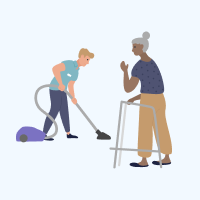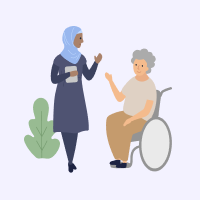Many carers see themselves as a family member or friend who looks after a person they love, not as a carer. This means that they may not think to look – or ask – for help.
If you’re providing a family member, partner or friend with regular and ongoing care and help – without being paid – then you’re a carer. And you can get help and support from the government and other organisations.
A carer may give care for a few hours a week or all day, every day, depending on the level of support needed. Care can be received:
- in the older person’s home
- in a residential aged care home
- in your home.
Carer Gateway: Support for you as a carer
If you’re a carer, it’s important you take some time to look after your own health and wellbeing because it will help you in your caring role. Carer Gateway provides carer specific in-person, phone, and online services and support nationally to help you in your caring role.
Carer Gateway phone line
You can call 1800 422 737, Monday to Friday, between 8am and 5pm, to speak to a Carer Gateway service provider. They will talk with you to understand your needs and provide the support and services to assist you in your caring role, including:
- carer support planning
- in-person and phone-based counselling and peer support
- targeted financial support through carer directed support packages, including supporting participation in employment, education, planned respite, and assistance with items such as transport or cleaning
- information and advice
- access to emergency respite (available to access 24/7)
- assistance with navigating relevant, local services available to carers through federal, state and local government and non-government providers, including My Aged Care, the National Disability Insurance Scheme and palliative care.
Note: Assistance to access Emergency Respite is available 24 hours a day and seven days a week by calling 1800 422 737.
Carer Gateway website
The Carer Gateway website also provides access to practical information, advice, resources and online support services, such as:
- an online peer support forum
- self-guided coaching and skills courses
- access to the national phone counselling service
- advice and information on other services available from the government and carer support organisations.
Caring for someone with a particular need
Everyone’s care needs are different. There are many resources, services, and support groups available when caring for someone with a particular need, or in a particular situation:
- Caring for someone living with dementia
- Caring for someone with a chronic disease
- Caring for someone with incontinence
- Caring for someone with a mental health condition
- Caring for someone with hearing, vision and oral health difficulties
- Caring for someone with a disability
- Caring for someone nearing the end of their life
Read more about caring for someone at home or caring for someone in an aged care home.
Tips for being confident in your caring role
Making sure others understand your needs will help you balance your role as a carer with other aspects of your life. Be confident about talking to the person you care for about your need to be:
- acknowledged and included in decision-making
- treated with dignity and respect
- asked to help, not just expected to help
- given privacy.
Other tips include:
- carrying out only the tasks you are comfortable with
- voicing your concerns and offering suggestions
- asking other family members for support
- providing relevant information to doctors, nurses and other service providers
- talking about support services available and accessing them when you need help.


